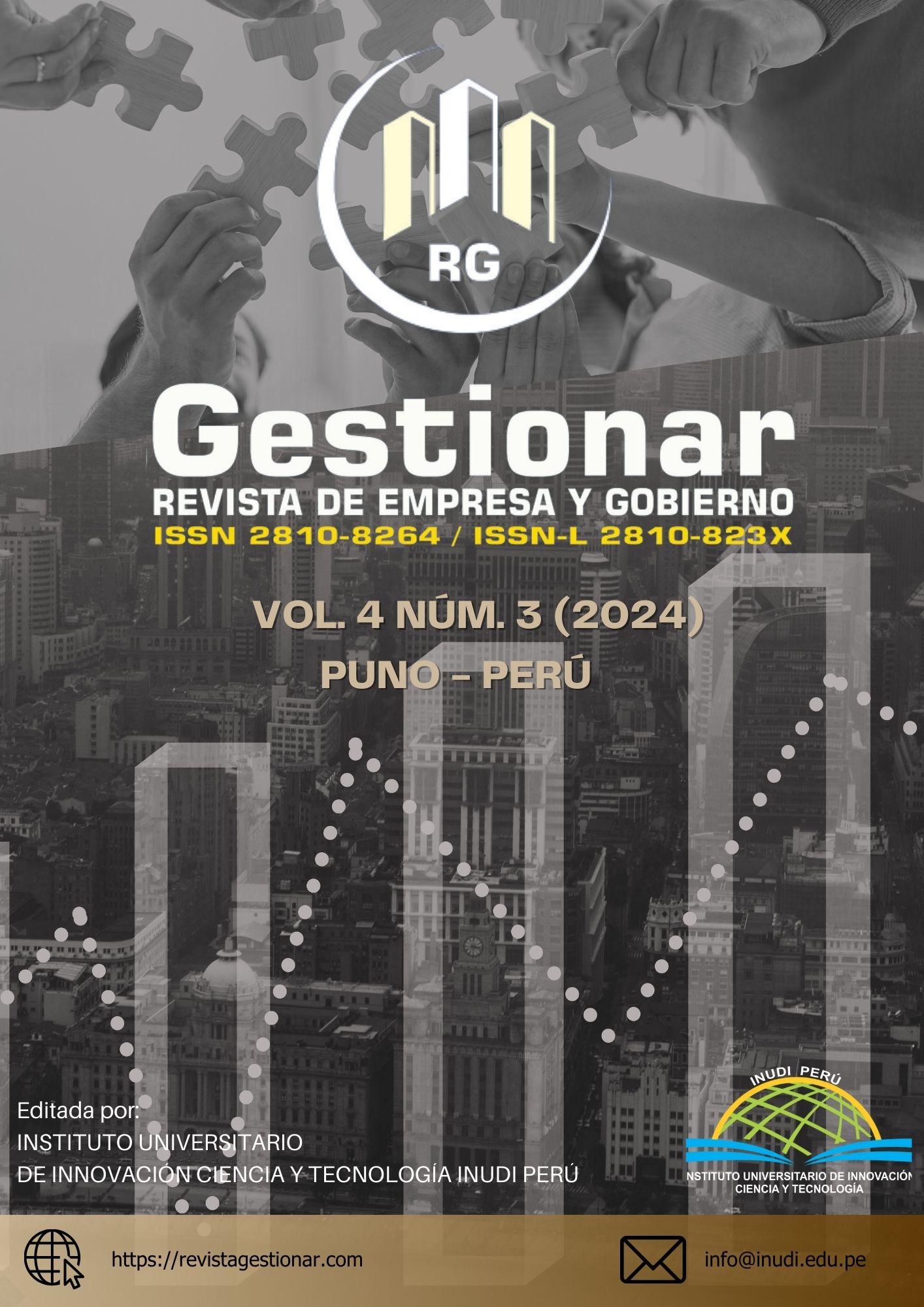Impoverishment from out-of-pocket health spending in Peruvian households, 2015-2020
DOI:
https://doi.org/10.35622/j.rg.2024.03.001Keywords:
COVID-19, determinants, impoverishment, out-of-pocket spending, healthAbstract
Economic literature has shown that out-of-pocket healthcare spending is the most unequal and inefficient way to finance medical care. It harms household welfare; as it increases family expenses and decreases consumption of basic goods like food. In situations of health "shock", these further aggravate and impoverish households. This study analyzes the impoverishment due to out-of-pocket healthcare spending in Peruvian households during the period 2015-2020. It followed the methodology of the World Health Organization and used the logit model to estimate the determining factors of such impoverishment. The results show that out-of-pocket health spending impoverished, on average, 2.6% of non-poor households, with greater impoverishment during the COVID-19 pandemic in 2020, at 3.53%. It was found that the factors determining impoverishment due to health spending were per capita household income, schooling, presence of chronic discomfort, disability of a household member, unmet basic needs such as inadequate housing, overcrowding and lack of sanitary facilities, low school attendance, and high economic dependency, health insurance. Finally, it was found that non-poor urban households become impoverished to a greater extent compared to rural households.
References
Akazili, J., Ataguba, J. E. O., Kanmiki, E. W., Gyapong, J., Sankoh, O., Oduro, A., & McIntyre, D. (2017). Assessing the impoverishment effects of out-of-pocket healthcare payments prior to the uptake of the national health insurance scheme in Ghana. BMC International Health and Human Rights, 17(1). https://doi.org/10.1186/s12914-017-0121-7 DOI: https://doi.org/10.1186/s12914-017-0121-7
Alvi, Y., Faizi, N., Khalique, N., & Ahmad, A. (2020). Assessment of out-of-pocket and catastrophic expenses incurred by patients with Human Immunodeficiency Virus (HIV) in availing free antiretroviral therapy services in India. Public Health, 183, 16–22. https://doi.org/10.1016/j.puhe.2020.03.031 DOI: https://doi.org/10.1016/j.puhe.2020.03.031
Correa-Burrows, P. (2012). Out-Of-Pocket Health Care Spending by the Chronically Ill in Chile. Procedia Economics and Finance, 1, 88–97. https://doi.org/10.1016/s2212-5671(12)00012-3 DOI: https://doi.org/10.1016/S2212-5671(12)00012-3
Das, S., Sundaramoorthy, L., & Bhatnagar, T. (2020). Out-of-pocket expenditure for delivery at home and public health facilities in the context of conditional cash transfer and free delivery care programs: An analytical cross-sectional study in South 24 Parganas district, West Bengal, India, 2017. Clinical Epidemiology and Global Health, 8(4), 1395–1401. https://doi.org/10.1016/j.cegh.2020.06.007 DOI: https://doi.org/10.1016/j.cegh.2020.06.007
Ebaidalla, E. M., & Mohammed, E. M. A. (2017). Determinants and Impact of Households’s Out-of-Pocket Health Care Expenditure in Sudan: Evidence From Urban and Rural Population. In Working Papers (1170). Economic Research Forum.
Garg, C. C., & Karan, A. K. (2009). Reducing out-of-pocket expenditures to reduce poverty: A disaggregated analysis at rural-urban and state level in India. Health Policy and Planning, 24(2), 116–128. https://doi.org/10.1093/heapol/czn046 DOI: https://doi.org/10.1093/heapol/czn046
Hooda, S. K. (2017). Out-of-pocket Payments for Healthcare in India. Journal of Health Management, 19(1), 1–15. https://doi.org/10.1177/0972063416682535 DOI: https://doi.org/10.1177/0972063416682535
Keane, M., & Thakur, R. (2018). Health care spending and hidden poverty in India. Research in Economics, 72(4), 435–451. https://doi.org/10.1016/j.rie.2018.08.002 DOI: https://doi.org/10.1016/j.rie.2018.08.002
Ku, Y. C., Chou, Y. J., Lee, M. C., & Pu, C. (2019). Effects of National Health Insurance on household out-of-pocket expenditure structure. Social Science and Medicine, 222, 1–10. https://doi.org/10.1016/j.socscimed.2018.12.010 DOI: https://doi.org/10.1016/j.socscimed.2018.12.010
Lavilla, H. (2012). Empobrecimiento por Gasto de Bolsillo en Salud Informe Final. Consorcio de Investigación Económica y Social (CIES), 1–84.
Maddala, G. S. (1983). Limited-Dependent an Qualitative Variables in Economics. Cambridge University Press, 257–291. DOI: https://doi.org/10.1017/CBO9780511810176
Mamani, J. W. (2019). Análisis de los principales determinantes de la incidencia de gasto catastrófico de bolsillo en salud para los hogares del Perú y Puno – 2017. [Tesis de grado, Universidad Nacional del Altiplano]. http://repositorio.unap.edu.pe/handle/20.500.14082/10502
O’Donnell, O., van Doorslaer, E., Wagstaff, A., & Lindelow, M. (2008). Analyzing Health Equity Using Household Survey Data : A Guide to Techniques and Their Implementation. In Analyzing Health Equity Using Household Survey Data. The World Bank. https://doi.org/10.1596/978-0-8213-6933-3 DOI: https://doi.org/10.1596/978-0-8213-6933-3
Organización Mundial de la Salud. (2019, February 20). Los países están gastando más en salud, pero las personas siguen pagando demasiado de sus bolsillos. https://cutt.ly/pegbak6e
Petrera, M., & Jiménez, E. (2018). Determinantes del gasto de bolsillo en salud de la población pobre atendida en servicios de salud públicos en Perú, 2010–2014. Rev Panam Salud Publica, 42, 1–7. https://doi.org/10.26633/RPSP.2018.20 DOI: https://doi.org/10.26633/RPSP.2018.20
Van, E. (2007). Paying Out-of-Pocket for Health Care in Asia: Catastrophic and Poverty Impact (Working Paper 2).
Wagner, N., Quimbo, S., Shimkhada, R., & Peabody, J. (2018). Does health insurance coverage or improved quality protect better against out-of-pocket payments? Experimental evidence from the Philippines. Social Science and Medicine, 204, 51–58. https://doi.org/10.1016/j.socscimed.2018.03.024 DOI: https://doi.org/10.1016/j.socscimed.2018.03.024
Wagstaff, A., Bilger, M., Sajaia, Z., & Lokshin, M. (2011). Health Equity and Financial Protection: Streamlined Analysis with ADePT Software. World Bank Publications. DOI: https://doi.org/10.1596/978-0-8213-8459-6
Woldemichael, A., Gurara, D. Z., & Shimeles, A. (2016). Community-Based Health Insurance and Out-of-Pocket Healthcare Spending in Africa: Evidence from Rwanda. IZA Discussion Papers. DOI: https://doi.org/10.2139/ssrn.2776927
Wooldridge, J. M. (2002). Econometric Analysis of Cross Section and Panel Data. https://cutt.ly/HegbavTx
World Health Organization. (2005). Distribution of health payments and catastrophic expenditures Methodology. https://www.who.int/publications/i/item/EIP-FER-DP.05.2
Yap, A., Cheung, M., Kakembo, N., Kisa, P., Muzira, A., Sekabira, J., & Ozgediz, D. (2018). From procedure to poverty: out-of-pocket and catastrophic expenditure for pediatric surgery in Uganda. Journal of Surgical Research, 232, 484–491. https://doi.org/10.1016/j.jss.2018.05.077 DOI: https://doi.org/10.1016/j.jss.2018.05.077
Published
Issue
Section
License
Copyright (c) 2024 Henry Sucari (Autor/a)

This work is licensed under a Creative Commons Attribution 4.0 International License.
LOS AUTORES RETIENEN SUS DERECHOS:
- Los autores retienen sus derechos de marca y patente, y tambien sobre cualquier proceso o procedimiento descrito en el artículo.
- Los autores retienen el derecho de compartir, copiar, distribuir, ejecutar y comunicar públicamente el artículo publicado en Gestionar: revista de empresa y gobierno (por ejemplo, colocarlo en un repositorio institucional o publicarlo en un libro), con un reconocimiento de su publicación inicial.
- Los autores retienen el derecho a hacer una posterior publicación de su trabajo, de utilizar el artículo o cualquier parte de aquel (por ejemplo: una compilación de sus trabajos, notas para conferencias, tesis, o para un libro), siempre que indiquen la fuente de publicación (autores del trabajo, revista, volumen, número y fecha).





















